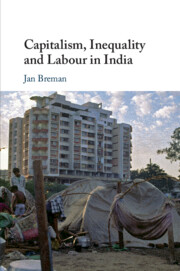Book contents
- Capitalism, Inequality and Labour in India
- Capitalism, Inequality and Labour in India
- Copyright page
- Contents
- Figures
- Preface
- Acknowledgements
- Part I Labour as Codified in the Annals of the State
- Part II Destitute in Bondage
- Part III The Political Economy of Boundless Dispossession
- Part IV Conclusion
- References
- Index
Part IV - Conclusion
Published online by Cambridge University Press: 29 July 2019
- Capitalism, Inequality and Labour in India
- Capitalism, Inequality and Labour in India
- Copyright page
- Contents
- Figures
- Preface
- Acknowledgements
- Part I Labour as Codified in the Annals of the State
- Part II Destitute in Bondage
- Part III The Political Economy of Boundless Dispossession
- Part IV Conclusion
- References
- Index
Summary
India’s informal economy is capitalist in nature and capitalism has consequently also become the dominant feature of the labour regime in which the country’s workforce is engaged. In an earlier publication I elaborated on how the shift to this political economy occurred (Breman 2013a). In this follow-up treatise I have described the character of informal employment within and outside agriculture, in rural and urban settings and for local as well as migrant labourers. Underlying my analysis are the findings of my rounds of fieldwork from 1962 to 2015, all in Gujarat. The focus of my investigations at the grassroots of the economy and of society has been on the castes-classes that are to a large extent or even totally without the means of production and therefore face many difficulties in providing for their livelihood. The main or only capital they possess is their labour power, which they have to sell in order to make a meagre living. Quite a substantial number are dispossessed to the extent that they are unable to freely dispose of the physical force they have and find out how to get the highest possible price and best terms of employment. Tracing the ordeal of this unfree workforce back over time, I have documented how colonial legislation fabricated the idea of a contract to classify as crime what had been custom in order to justify the practice of agrarian bondage all over the country after the abolition of slavery. Being ‘liberated’ from resources required for production and subsistence did not mean being double-free in the classical Marxist sense. The operative principle of capitalism is the extraction of labour surplus, but there is variety in the manner in which appropriation takes place. As Jairus Banaji has argued, capitalism has insistently tried to draw on and exploit a mix of ‘free’ and ‘unfree’ labour (Banaji 2003, Banaji 2010).
- Type
- Chapter
- Information
- Capitalism, Inequality and Labour in India , pp. 235 - 265Publisher: Cambridge University PressPrint publication year: 2019



